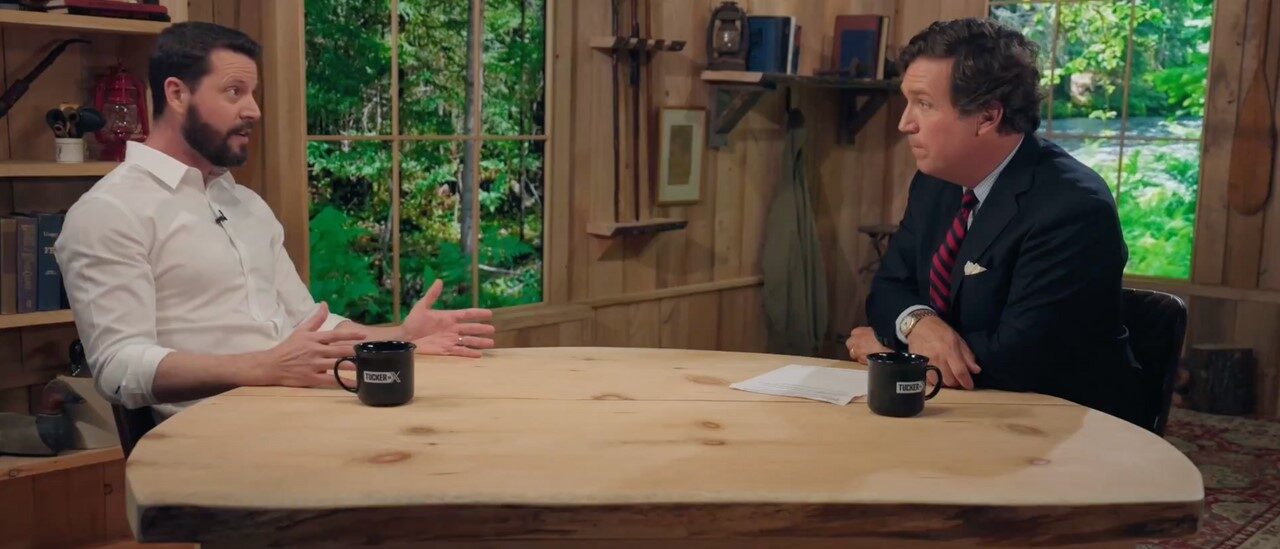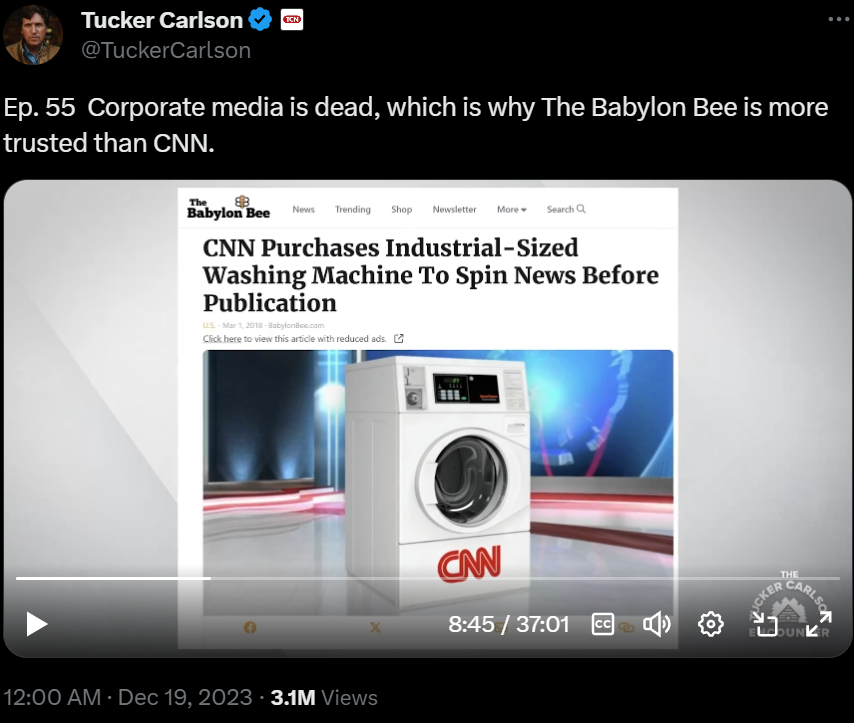YourNEWS Media Staff
YourNEWSTue, 19 Dec 2023 00:00 UTC

© @TuckerCarlsonSeth Dillon of Babylon Bee and Tucker Carlson
Seth Dillon of Babylon Bee and Tucker Carlson engage in a discussion on online censorship, emphasizing the desire for control over speech and thought as the primary reason.
Babylon Bee CEO Seth Dillon recently joined Tucker Carlson, co-founder of Daily Caller, to discuss experiences with online censorship.
Dillon appeared on Carlson's social media show to delve into the Babylon Bee's 2022 Twitter ban for alleged hate speech and its subsequent reinstatement by Elon Musk. The conversation was prompted by a clip of NBC News journalist Brandy Zadrozny criticizing Musk's decision, which led to a critique from
Carlson about the role of such journalists in society.
WATCH:
Dillon and Carlson discussed
the underlying motives for censorship, with Dillon suggesting it's a method to control speech and thought. He emphasized that mockery, a tool often used by the Babylon Bee, effectively exposes the absurdity of certain viewpoints, making it a target for censorship.
Carlson also voiced strong opinions on the subject, describing the attitude of those in favor of censorship as domineering and oppressive. He asserted that if they could censor, they would go to greater lengths to silence dissent, implying a potential for more severe actions.
The discussion highlighted Dillon's realizations about the nature of humor and its role as a "vehicle for truth delivery." He pointed out that
the backlash against the Babylon Bee is not just about being offended but is more about suppressing effective challenges to the dominant narrative.The Babylon Bee faced Twitter's censorship in March 2022 over a satirical post about U.S. Assistant Secretary for Health Rachel Levine. The social media platform accused the Bee of hateful conduct, leading to a standoff where Dillon refused to delete the offending post. After Elon Musk's acquisition of Twitter, the Babylon Bee was among the first platforms to be reinstated, as detailed in Dillon's
Twitter statement.
This conversation between Dillon and Carlson sheds light on the complex dynamics of online censorship, suggesting that
it's not just about controlling offensive content but rather about controlling the narrative and suppressing dissenting viewpoints.
Comment: One hilarious moment in the interview, is when they discuss the fact-checking of a satirical article that was published by Babylon Bee. Maybe it was this instant that invited Tucker Carlson to make his comment about CNN in the Tweet announcing the episode, given that the fact-checkers apparently would not put it past the CNN to have just such a washing machine that can spin the news before publication.

© @TuckerCarlson
While the above is seriously funny, a real problem is the censorship, a concern for both Seth Dillon and Tucker Carlson. There are also instances where satire unintentionally comes so close to what happens or later happens, that it is both surprising and disturbing for those writing the satirical articles, as well as their readers.
Below are links to searches on SOTT.net about the topics of censorship, fact-checking, freedom of speech, and narratives.
Censor, censorship
Search: Censor*
This search covers the verb and its derivatives as well as the nouns censor and censorship
Title: articles
Summary: articles
Text: articles
Comment: articles
Title and summary: articles
Title, summary and text: articles
Fact-checking
Search: "Fact-checking"
Title: articles
Summary: articles
Text: articles
Comment: articles
Title and summary: articles
Title, summary and text: articles
Freedom of expression; Freedom of speech
Search: "Freedom of expression"; and search: Freedom of speech [Match exact phrase]
Title: articles; articles
Summary: articles; articles
Text: articles; articles
Comment: articles; articles
Title and summary: articles: articles
Title, summary and text: articles; articles
Narrative, narratives
Search: Narrative*
Title: articles
Summary: articles
Text: articles
Comment: articles
Title and summary: articles
Title, summary and text: articles
There's no discussion, I will say whatever the hell I want and all the censors are doing is putting up a big sign....
"TRUTH DETECTED".